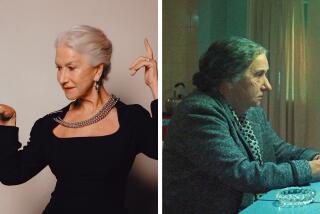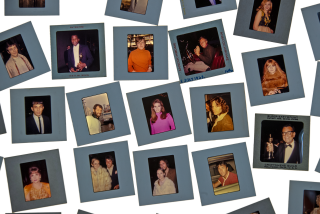Shear Endurance
“That’s Cary Grant,” says Nunzio Tringali, pointing to a framed photo--unmistakably Cary Grant, circa 1940s, hanging in Richard’s Barber Shop in Hollywood. “I’m cutting his hair.”
Tringali--now a dapper 85--is still cutting hair. Just as he did when he was barber to the stars at RKO Studios. “John Wayne, Bob Mitchum, Fred Astaire. . . .” He reels off the names of famous heads he has shorn.
It was 1933 when Tringali arrived at RKO at Melrose Avenue and Gower Street. He remembers, “They were shooting ‘Flying Down to Rio,’ ” in which Fred Astaire and Ginger Rogers danced the “Carioca.”
He’d learned his trade in his native Augusta, Sicily, apprenticing when he was 12. “There were no barber schools in those days,” he says.
Augusta’s school had only six grades, so that was his formal education. But, “There used to be salesmen coming around selling pages of adventure stories every month” and young Nunzio read them all, then devoured the classics, from Homer to Dante.
When he was 17, he immigrated with his fisherman father to Boston, where at night school he took English, literature and--”to improve my pronunciation”--drama.
“I didn’t want to be an actor. I wanted to be a writer,” he says.
When his father returned to Sicily in 1933, young Tringali came to California, hopeful of writing for the movies. Here, he became John. “My nom de plume,” he jokes. With a new friend, a barber who moonlighted as a movie extra, he began hanging around RKO. His friend got all the extra jobs, but Tringali got a job in the studio barbershop.
Those he clipped over the next decade included Damon Runyon and William Faulkner, who were writing screenplays, as well as the Gershwins, Irving Berlin and Cole Porter, who were doing musicals. Jimmy Durante came daily for a shave. “He’d say, ‘Watch the schnoz. . . .’ ”
Grant, despite his reputation for frugality, was an OK tipper, says Tringali. “The cheapest of them all was Rudy Vallee. He had one of those purses you squeeze. . . .”
In 1936, Tringali finally got his movie gig. He played a barber in a Burgess Meredith melodrama, “Winterset.” His one line: “Yes, he was here and he went downstairs.” And, he was a writer, doing a column, “Shavings of Hollywood,” for the studio newspaper.
Drafted in 1942, Tringali spent the war in Anchorage, cutting officers’ hair. But a studio publicity job awaited him on his return to RKO, where head publicist Perry Leiber had been impressed with “Shavings.” The job was “writing tidbits. We had two planters who’d plant the stories we wrote” with Hedda Hopper, Louella Parsons, Jimmy Fiddler.
“The most beautiful period of my life,” says Tringali, who still carries his yellowed membership card, Screen Publicists Guild, 1947.
But television was coming and 1947 was the beginning of the end. “The movie houses started closing. The studios stopped making pictures. They fired everybody, so I had to go back to barbering.” He joined his old barber/film extra friend, Cosmo Sarbo, at Cosmo’s, next door to Schwab’s drugstore.
About a dozen years ago, Cosmo’s closed and Tringali signed on with Richard Roberts, now proprietor of Richard’s.
As we talk, Tringali is clipping 30-year client Armando Perez, who followed him to Richard’s: “The guy’s got magic fingers,” says Perez.
A few Hollywood old-timers still come in to be coifed. And, says Roberts, “He’s built a clientele of younger guys. What’s old [short hair] is new.”
Tringali works part time now. “I used to be very, very busy,” he says, “but my clients died before me, thank God.”
More to Read
Only good movies
Get the Indie Focus newsletter, Mark Olsen's weekly guide to the world of cinema.
You may occasionally receive promotional content from the Los Angeles Times.










